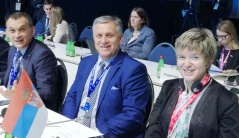European Integration Committee Deputy Chairperson Elvira Kovacs and Committee members Zvonimir Djokic and Vladimir Djuric took part in the 58th plenary meeting of the Conference of Parliamentary Committees for Union Affairs of Parliaments of the European Union – COSAC in Tallinn, 17 and 28 November, under the auspices of the Estonian presidency of the European Union Council.
One of the key topics of the plenary was the future of the European Union and it focused on the enlargement policy, EU candidate countries and the neighbourhood, talks with the UK, EU’s economic growth and challenges of the single market, possibilities for a more intensive cooperation between the most developed member states, as well as solidarity and EU’s social policy.
In the keynote addresses and the final conclusions, the members of the parliamentary committees for union affairs of parliaments of the European Union spoke of the historic success of the enlargement policy which ensured the stability and progress of the old continent. They strongly endorsed the policy of further enlargement and commended the progress achieved by the Western Balkan countries in the membership talks, concluding that the enlargement policy should remain the key European policy, as an investment into peace, democracy, prosperity, security and stability of the European continent.
Elvira Kovacs, Deputy Chairperson of the European Integration Committee, said that constant support and encouragement of the European perspective of all the countries of the Western Balkans is vital, adding that she was sure all the EU member states would support the Serbian institutions’ efforts by endorsing the opening new negotiation chapters. Kovacs stressed that the enlargement process remains crucial to maintain the momentum of the reform process, for the future of the Western Balkan countries and the wellbeing and stability in the region, and thanked the EU member states and institutions for their support.
In the course of the two-day meeting the members of the parliamentary committees for union affairs of the parliaments of the 28 European Union member states, the European Parliament, parliaments of EU candidate countries, European Commission, special guests, EU Council and the European External Action Service discussed bringing the EU closer to its citizens, digitalization and development of e-services on the single market, building an effective and sustainable Security Union, current refugee crisis and combating irregular migration.
The members of parliament of the EU member states also spoke about the importance of strengthening the unity and openness of the European Union in the context of the challenges of the talks on UK’s exit from the EU and growing xenophobia and populism. They emphasized the importance of digital technologies for boosting openness, efficiency and accountability of the institutions. The meeting was continued with a debate on the best practices national parliaments employ to bring Europe closer to their citizens when the speakers presented different outreach models and pinpointed enhancing transparency of the European institutions as the most basic prerequisite for good parliamentary oversight.
Speaking about the digital single market and e-services, the participants pointed out that digitalization of the public sector goes beyond providing on-line services, it lies in the overall simplification of procedures for the citizens, from establishment of companies and paying taxes, to electronic voting. The parliamentarians also discussed the security aspects of eGovernment and emphasized the need to draft European digital strategy. European Integration Committee member Vladimir Djuric said that Serbia, as a candidate country, invests enormous efforts into digitalization by setting up a special office for information technology and development of e-services, and its National Assembly has an electronic voting system, paperless sessions and electronic document management. Djuric said that digitalization enhances the democratic processes and contributes to the efficiency of public administration, but also has challenges of its own which require comprehensive and optimal solutions. He informed the attending that the national IT industry, with experts educated in the country, is experiencing an over 25% annual growth, is pro-export oriented, well-respected on many EU markets, and undoubtedly contributes to the creation of a society grounded in knowledge and skills.
Speaking of security in the EU, refugee crisis management and illegal migrations, the parliamentarians restated the need to preserve European values and ideas, the Schengen system and security of Europe and its citizens. The member states mostly agreed that it is important to show solidarity and provide efficient humanitarian and financial assistance at the most vulnerable points, work on solving the cause of the crisis, boost control at the outer borders of the European Union and ensure the security of its citizens. Committee Deputy Chairperson Elvira Kovacs said that Serbia had from the onset of the migrant crisis faced challenges too big to handle on its own, but had invested enormous efforts to ensure adequate living and temporary stay conditions for all the refugees and migrants on its territory. She reminded the assembly that illegal migration remains a big challenge on the closed Western Balkan route and Serbia has done all in its power to combat them efficiently. Kovacs said that coordination and cooperation in the fight against illegal migration needs to be improved, as should the application of common solutions to the refugee crisis, and the EU needs to secure more financial aid for the candidate countries which are a much needed and reliable partner in all common challenges on the outer borders.




